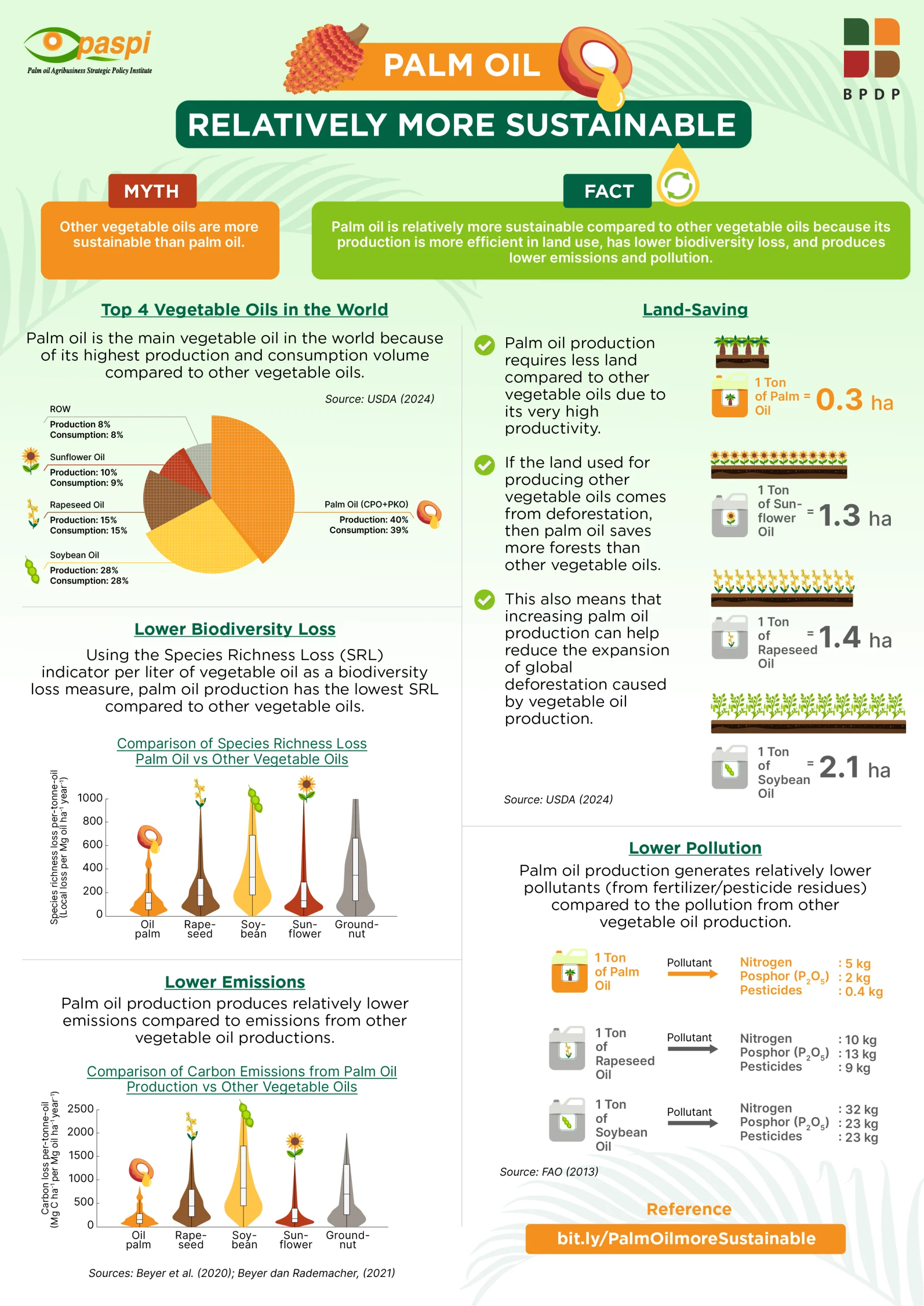
Among the 17 types of edible oils produced and consumed globally for food and energy, only four are considered the world’s major vegetable oils: palm oil, soybean oil, rapeseed oil, and sunflower oil. These four types account for around 90% of global vegetable oil production and consumption.
Among these Top-4 vegetable oils, palm oil ranks as the most dominant in global production and consumption. Although oil palm plantations only began commercialization in the 1970s–1980s and saw revolutionary production growth in the early 2000s, palm oil managed to overtake soybean oil, which had dominated the global vegetable oil market for nearly a century.
The proverb “the taller the tree, the stronger the wind blows” aptly reflects the dynamics of palm oil. Despite its achievement as the world’s leading vegetable oil, palm oil has faced many accusations, negative issues, black campaigns, and anti-palm oil movements—many of which are initiated by communities in Western countries. This dynamic illustrates the non-price competition between palm oil and other vegetable oils.
In the 1980s, competitors (i.e., other vegetable oil producers) attempted to undermine palm oil using a health narrative—claiming that palm oil contains cholesterol. This negative perception was campaigned by the American Soybean Association (ASA) with the actual intent of banning palm oil imports into the U.S. market. The campaign was countered by researchers from palm oil–producing countries who argued that palm oil contains no cholesterol, as it is plant-based, and cholesterol exists only in animals and humans. Although many recent empirical studies support this claim, the misconception that palm oil contains cholesterol remains widespread—even within Indonesia.
After being refuted using data and empirical facts, transnational NGOs backed by countries producing alternative vegetable oils resumed their black campaign against palm oil using environmental issues. Palm oil was labeled as unsustainable, and its production-consumption activities were blamed as major contributors to global environmental degradation.
On the contrary, numerous empirical studies indicate that palm oil is relatively more sustainable compared to other vegetable oils. Oil palm plants have the advantage of high productivity. Oil yield per hectare from oil palm is about 8–10 times higher than other oil crops (soybean, rapeseed, and sunflower). Consequently, palm oil requires less land. To produce 1 ton of oil, oil palm only needs 0.3 hectares of land. In contrast, sunflower, rapeseed, and soybean require 1.3 ha, 1.4 ha, and 2.1 ha, respectively.
Assuming the land used for vegetable oil production comes from deforestation, this means that palm oil is far more land-efficient, resulting in less deforestation compared to other oils. Therefore, palm oil can actually help prevent broader global deforestation in the production of vegetable oils.
Other empirical studies also support palm oil’s sustainability advantages. For instance, studies by Beyer et al. (2020) and Beyer & Rademacher (2021) found that carbon emissions from palm oil production are lower than those from other vegetable oils. These studies also revealed that biodiversity loss from palm oil production is significantly smaller. A FAO (2013) study also showed that palm oil production generates fewer pollutants (such as pesticide and fertilizer residues) than rapeseed and soybean oil.
Of course, the production of all types of vegetable oil (including palm oil) across producing countries remains linked to deforestation, biodiversity loss, emissions, and pollutants. Seeking a vegetable oil that is completely free from these environmental issues is unrealistic. Thus, the argument should no longer be about finding the “cleanest” oil, but rather: which oil is relatively more efficient in minimizing deforestation and emissions? The answer is palm oil.
Palm oil’s relative sustainability advantage continues to be improved through efforts along the entire production chain. This commitment is reflected in compliance with ISPO and RSPO sustainability certifications (and others). In fact, through the ISPO Presidential Regulation, sustainability commitment has become mandatory at the on-farm level for both corporations and smallholders. This awareness is even being extended to Indonesia’s downstream palm oil industry, although there are still no regulations issued or disseminated to the public regarding ISPO certification for final palm oil products.
